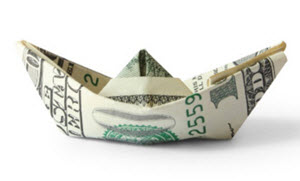When not to borrow money
For speculation
There are a lot of people in this world that has become rich investing borrowed money, but that doesn’t automatically mean that it is a good idea for the average wage-earner to invest or speculate on credit.
 If you sign up for a securities broker account, they are likely to offer you a line of credit, e.g. in the form of so called leverage. Speculating on credit is always risky, because you can end up losing more money than you originally put into your account and end up in a situation where you actually owe the broker money.
If you sign up for a securities broker account, they are likely to offer you a line of credit, e.g. in the form of so called leverage. Speculating on credit is always risky, because you can end up losing more money than you originally put into your account and end up in a situation where you actually owe the broker money.
Leverage is an investment strategy where you use borrowed money to (hopefully) generate a large return.
Example: You put $100 into your broker account. The broker offer you to leverage it 10 to 1 and you agree. For each $10 you invest, only $1 comes from your deposit – the rest is borrowed money.
This can be a good idea if you invest in low risk investments but should be avoided if you make high risk investments. It is especially important to never borrow money to invest in very high risk investments such as binary options. If you do not know what a binary option is I recommend that you visit binaryoptions.co.uk to find out. The short answer is that it is a bet on the movements of an underlying financial instrument. A binary option can only have two outcomes. It ends in the money and you make a large profit or it ends out of the money and you lose your entire investment. Never risk your future by borrowing money to speculate in high risk investments.
To pay back other loans – unless you can get a better loan
When faced with bills and mandatory repayments, it can be tempting to borrow money to pay off old debts. You may for instance use a new credit card to make interest payments on an old credit card. This is a very risky tactic and one that can lead you into financial ruin.
 If you have financial obligations that you struggle to meet, it is better to take charge of the situation right away instead of pushing the problem into the future by building up even more debt. For instance, it may be better to contact the credit card company and see if there is a grace period that you can use if you are temporarily in dire straits. It can also be a good idea to start selling off any assets, such as jewellery, vehicles and clothes, to pay of your debts rather than create a situation that is getting progressively worse for each month. Yes, being without a car might suck, but it if helps you to get your debts down it can definitely be worth it. There are of course exceptions – if you need your car to get to work and public transportation is non-existent, then keep the car so you can keep on bringing home a paycheck. On the other hand, if reasonably priced public transportation is available but you simply don’t like to ride on the bus, then you need to grow up, face the music and sell your car.
If you have financial obligations that you struggle to meet, it is better to take charge of the situation right away instead of pushing the problem into the future by building up even more debt. For instance, it may be better to contact the credit card company and see if there is a grace period that you can use if you are temporarily in dire straits. It can also be a good idea to start selling off any assets, such as jewellery, vehicles and clothes, to pay of your debts rather than create a situation that is getting progressively worse for each month. Yes, being without a car might suck, but it if helps you to get your debts down it can definitely be worth it. There are of course exceptions – if you need your car to get to work and public transportation is non-existent, then keep the car so you can keep on bringing home a paycheck. On the other hand, if reasonably priced public transportation is available but you simply don’t like to ride on the bus, then you need to grow up, face the music and sell your car.
As mentioned in the headline, there is actually a situation when borrowing money to pay back other loans is a great idea, and that is when the new loan comes with better T&C’s than the old loans. If you have a lot of high-interest credit card debt that is costing you a fortune in interests and late fees, then taking out a proper bank loan with a lower interest rate and a longer repayment period can save you a lot. Also, for many, it is easier to have ONE major repayment to do each month rather than juggling several credit card bills and other small loans.
When it means dipping into your retirement savings
In some countries, including the United States, you have the option of borrowing money from your own retirement fund. In the United States, dipping into ones 401 (k) plan is quite common, but before you make this decision you should really think long and hard because there are many negative sides to borrowing from your retirement plan. Although the exact repercussions may vary from country to country, the basic problem is always the same – you are borrowing money that should ideally be left to grow for your retirement instead.
You may be blocked from adding money
Most plans are constructed in a way that makes it impossible for you to make additional contributions to your retirement plan until you have repaid the loan in full. This means that in addition to borrowing money from your retirement plan, you are also blocking your self from adding to the plan, even in situations where adding to the plan would be highly beneficial (e.g. because of tax reasons or employer matching schemes). If your retirement plan does not have this type of provision, then borrowing from it is less of a problem, at least from this perspective.
The money is no longer yielding you a profit
 Borrowing from your retirement plan means that the invested money is given to you as a loan instead. Therefore, you are missing out on potential growth in the stock market, bond market, etc.
Borrowing from your retirement plan means that the invested money is given to you as a loan instead. Therefore, you are missing out on potential growth in the stock market, bond market, etc.
Of course, there are situations where borrowing money from ones retirement plan has turned out to be a good idea, e.g. when the borrowed money was used to purchase real estate and the real estate turned out to be a more profitable investment than what investing in stocks would have been.
Taxes taxes taxes
When you are paying back your loan, you are paying it back with after-tax money. Let’s assume you are in a tax bracket where you pay 25 percent tax. When you earn $100, you only get $75 that can be used to pay back your loan. Those $75 will then be taxed again when you retire and withdraw money from your retirement plan.
If you do not repay the loan, it is treated as a withdrawal
In most countries, there is a provision that states that if you fail to repay the borrowed money, it will be treated as a withdrawal instead.
Example: If you have borrowed money from your 401 (k) in the United States and fail to pay back, the outstanding loan balance will be seen as a withdrawal and be subjected to current income tax. If you are under the age of 59.5 years, there will also be a 10% early withdrawal penalty.
In some countries, you will face even more problems than simply having to pay income tax and a penalty. Retirement plans are typically treated favorably from a tax point of view, because the authorities wants us to save for our retirement. However, this favorable treatment will fly out the window when you prematurely withdraw money from your account, because you are now treating your retirement account as if it was just any other savings- and investments account.
It might prevent you from accepting a new job offer
Many retirement plans have a provision that states that if you quit your job, it is your duty to immediately repay the loan in full. This means that you might get stuck in a certain job position and be unable to accept new and better job offers, simply because you can not repay the loan at once. If you quit your job and refuse to pay back the loan at once, the borrowed money will be treated as an early withdrawal. As explained above, early withdrawals can be very expensive.
